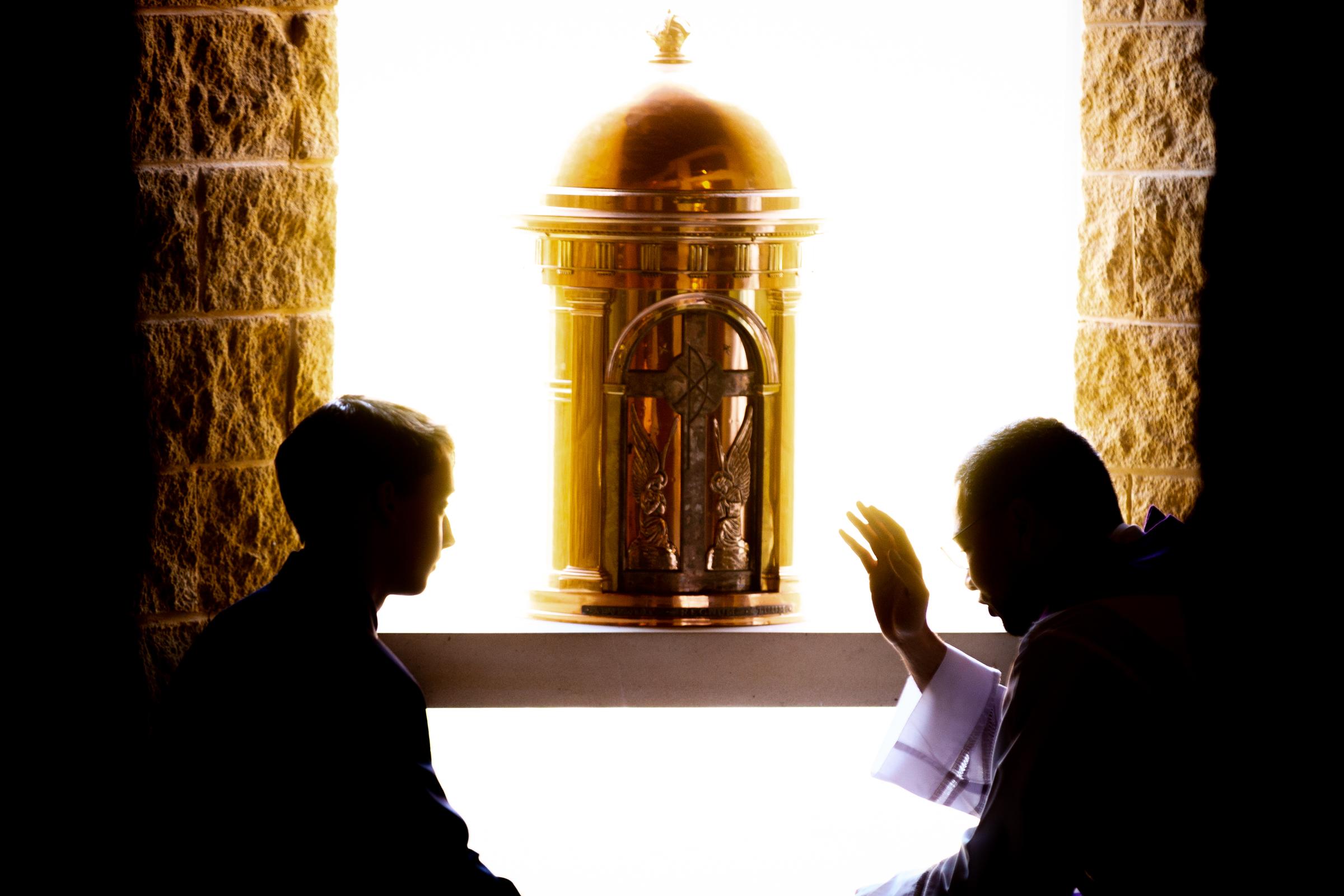Liturgy

Community Mass
Next Friday, 12 August, Community Mass will be prepared by Ward House. Ward families are especially welcome to join this celebration.
The following week, Community Mass will be Monday, 15th August, as it is the feast of the Assumption of Mary.
Community Mass is usually celebrated at 8:00am in the Chapel during term time. The table below shows the changes in Week 5 (Assumption) and Week 7 (Father's Day).
Week 4 12 August | Community Mass at 8:00 am Chapel
| Prepared by Ward House |
Week 5 15 August (Mass on MONDAY)
| Community Mass at 8:00 am Chapel | Feast of the Assumption (Community Mass)
|
Week 6 26 August
| Community Mass at 8:00 am Chapel | Prepared by students in Year 10 |
Week 7 2 September | Primary/Secondary Mass at 7:30 am St Louis Sports Centre
| Dedicated to fathers |
- College Chapel
- Fridays in term time
- Starts: 8:00am and concludes 8:30am
SACRAMENT PROGRAM
‘Family-focused, parish-based, Catholic school supported’
Parents of students in Years 3, 4 and 6
To make arrangements for your child to celebrate the sacraments this year, contact the Parish Priest or Sacrament Coordinator in your own home parish at the earliest.
Enrolment details for parishes of City Beach, Doubleview, Subiaco and Cottesloe/Mosman Park, may be found here. Cottesloe/Mosman Park parish advises that enrolments for the Sacrament of Confirmation will close on 1 August.
If you would like further information contact:
- If your nearest parish is not listed, search the Archdiocesan website;
- Contact Mary-Anne Lumley mary-anne.lumley@cewa.edu.au 08 9383 0513.
The Gospel & the Commonwealth –
19th Sunday in Ordinary Time
Homily for this Sunday’s Gospel by Father Michael Tate.
The Jewish Jesus of Nazareth lived in a remote part of the Roman Empire under the rule of a political and religious elite collaborating with the oppressors.
The majority were peasants or fishermen eking out an existence, or day labourers. Their plea was from the stomach: ‘Give us this day our daily bread.’
One of the few ways in which redistribution of wealth could occur was by voluntarily giving to the poor. Jesus inherited the Jewish tradition which was especially concerned with the fate of widows and orphans, those without a male breadwinner to protect them.
It is in that sort of society that Jesus instructs his followers: ‘Sell your possessions and give generously to those in need.’
We live in a very different society. The full title of this nation is: ‘The Commonwealth of Australia’. The Common-wealth, a rather extraordinary and wonderful title. No doubt it has various levels of meaning, but one must surely be that the wealth of this nation, its people and resources, are meant to be directed to the common good. We are a common-wealth.
We are indeed fortunate. We do not live under the boot of an occupying army. We live in a democracy which is itself a shared privilege and common responsibility. I was talking to someone the other night who, as a new citizen, had taken the Pledge of Allegiance. I told her that in a ‘previous existence’ I had actually written it. It commences:
‘From this day forward [under God]
I pledge my loyalty to Australia and its people
Whose democratic values I share’
And so it goes on. For Australians at least, it seems that democracy, sharing and common-wealth are inextricably linked. And so, when working out how we might respond to our Lord’s command: ‘Sell your possessions and give to the poor’, we can do so in ways very different to what was possible in his day.
We have a compulsory taxation system. We are forced to give up some of our possessions, some of our wealth to the common-wealth. To distribute that wealth the political parties put forward various policies in the fields of social security, medical and hospital care, education and so on.
Bringing these two together, taxation and social justice policies, helps fulfil Our Lord’s command to give up some of our possessions to create a society more humane, more civilized, more decent than anything remotely possible under the Roman Empire.
And that would please Our Lord. Why?
Of course, in part because those in need are helped. But, perhaps in greater part, because it makes us different people, larger hearted people: If your treasure is self centred, that is how you may end up for eternity: a hellish existence.
Our Lord wants us to be people whose hearts are expanded and have room for others. We have to arrive at the moment of death with a heart so capacious, so spacious that it can include the billions of people we hope inhabit heavenly existence. And Our Lord says that one indication of our being prepared is:
‘Where your treasure is, there will your heart be also.’
Where you want your taxes to go can ready you for Heaven!! So, today’s Gospel has something to say to us as voters. And also, more threateningly, about politicians.
We may regard the Commonwealth as a household in which politicians are the stewards. The second part of today’s Gospel contains a warning for politicians. The stewards of God’s household are not there for their own benefit: ‘eating and drinking’. They are there to ensure that all in the household get ‘their allowance of food at the proper time’.
Let us pray during this Mass for whoever is entrusted with the offices of political leadership, that they will carry out their mandate with the words of Our Lord reverberating:
‘Everyone to whom God has given much, God will demand much from them; the one to whom God has entrusted much, God will demand much more from them.’
Rev Prof Michael Tate graduated in Law from the University of Tasmania in 1968, and in Theology from Oxford University in 1971. He lectured at the University of Tasmania from 1972-78, being Dean of the Faculty of Law in 1977-78. He was a Senator for Tasmania from 1978-93, being Federal Minister for Justice from 1987-93. He served as Ambassador to The Hague and the Holy See from 1993-96. He then returned to Australia and was ordained in May 2000 and has been a parish priest in the Archdiocese of Hobart since then. He is an Honorary Professor of Law at the University of Tasmania where he lectures in International Humanitarian Law.



